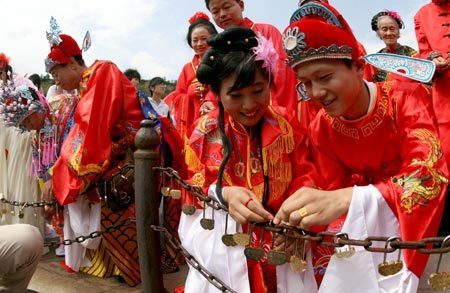Roses, chocolates, and the first-ever romance movie made especially for "China's Valentine's Day" -- China's lovers were spoilt for choice on the Qixi Festival, which fell on Wednesday.
Directed by and starring Yu Feihong, "Eternal Beloved," which premiered in Beijing Wednesday, is a romance that crosses between the living and the dead and is promoted as China's version of the 1990 Hollywood blockbuster, "Ghost."
"The premier was set for Qixi because we felt the air of romance might stir up enthusiasm," said a woman surnamed Ye, with promoter Stellar Mega Film.
 |
|
The newlyweds perform the traditional matrimonial custom of locking up the Same Heart Lock, during the 2009 large international collective weddings in traditional Chinese Custom, at the Pujiu Temple of Yongji City, north China's Shanxi Province, Aug. 26, 2009. A total of 99 couples of brides and bridegrooms from China and overseas join in experiencing the flamboyant mass nuptials in traditional Chinese custom at the Pujiu Temple, where legendary romance of love in the Story of West Chamber occurred, to mark the Double Seventh Festival, the equivalent of Chinese Valentine's Day. [Xinhua] |
Set around a family feud and winds through the two lovers' present and reincarnated lives, its fantasy nature reflects the origins of the Qixi festival based around the myth of Niulang, the mortal orphan cowherd, and weaving maid Zhinu, a heavenly being.
Qixi, which is the seventh day of the seventh lunar month, originated in Han Dynasty (206 BC-220 AD) and became popular in the Tang and Song dynasties.
"The only thing I know about Qixi is the love story of Niulang and Zhinu. The traditional festival is not a national holiday, and we often forget this lunar-calendar festival," said Yang Xue, a college graduate who came to watch the premiere.
"Qixi is a time for roses and chocolates, just like the Western Valentine's Day on the Feb. 14, when my boyfriend buys me flowers or we go shopping and have a romantic meal together," she said.
Qixi was listed as an intangible cultural heritage by China's State Council in 2006, and has since regained popularity among the Chinese, especially the young.
However, critics say it has become too commercialized, with retailers offering discounts to boost sales, especially of flowers and chocolates.
A 5-meter-tall teddy bear was erected in the Sun Dong An Plaza in Beijing's bustling Wangfujing Shopping Street on Wednesday, where thousands of "lover teddy bears" were given out to shoppers.
"We had thought of using the images of Niulang and Zhinu in promotions, but our bosses said the folk story of Niulang and Zhinu was tragic and not suitable for the joyful atmosphere they wanted," said a woman surnamed Yin, with the mall's sales promotion division.
She said the market for Qixi was still maturing, and they would consider producing cartoon images of Niulang and Zhinu to decorate the shopping mall in a traditional style, like decorations for the Spring Festival, China's lunar new year.
"Qixi lacks symbols like the rice dumplings for Dragon Boat Festival and moon cakes for Mid-Autumn Festival," said Chen Jing, director of Folk-Custom Studies at Nanjing University.
Folk-custom experts have suggested that Chinese should look back to old traditions of Qixi, such as exchanging "love peas", wearing Han Dynasty robes, stargazing, releasing lotus lanterns on rivers and holding matchmaking fairs.
Wang Sichao, researcher of Purple Mountain Observatory with Chinese Academy of Sciences, suggested young couples observe the stars on the evening of Qixi to find Altair, the star believed to represent "Niulang," and Vega, the star of "Zhinu," who are separated by the Milky Way.
"The best time to observe the stars is two hours after sunset," he said.
(Xinhua News Agency August 27, 2009)